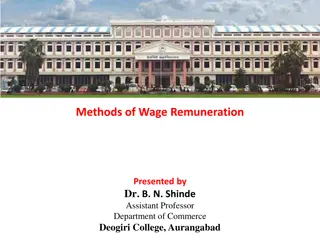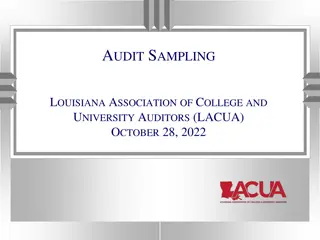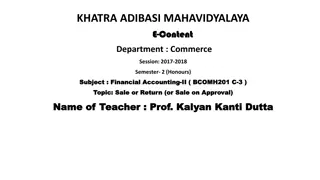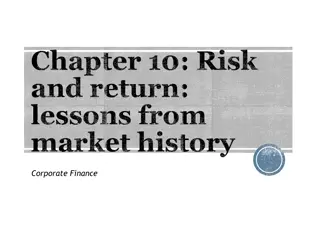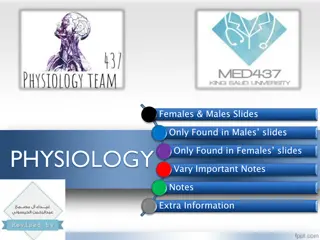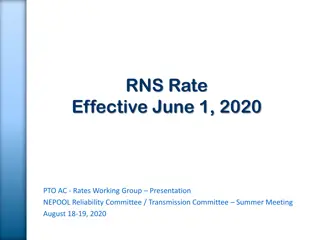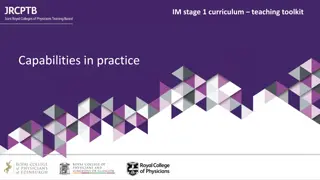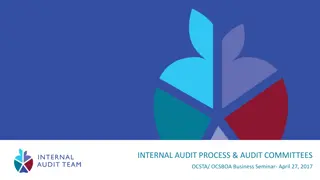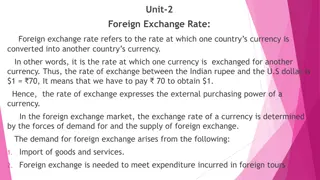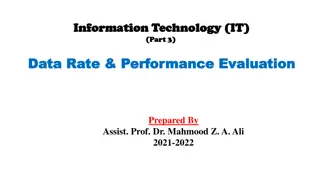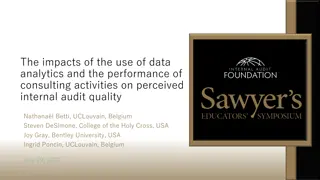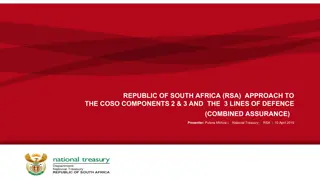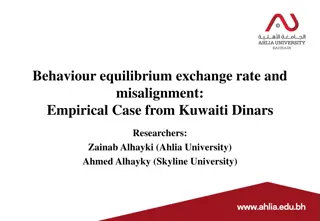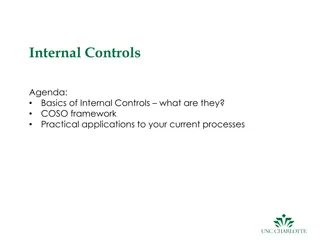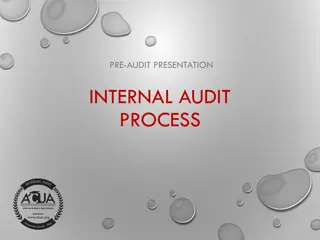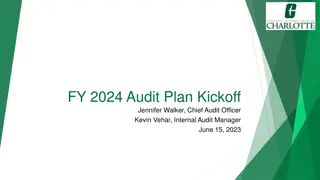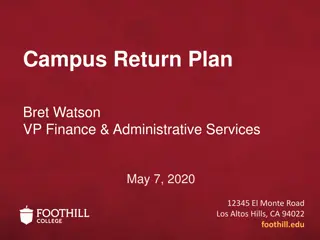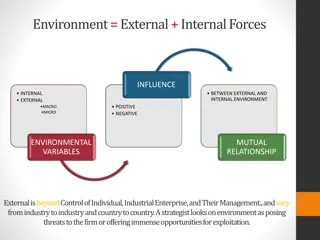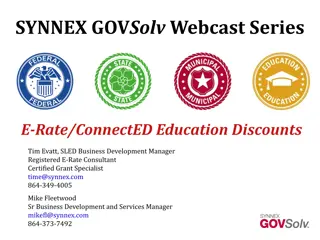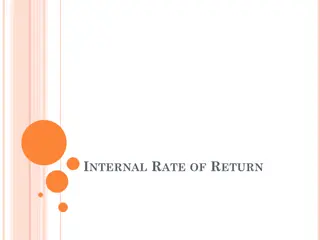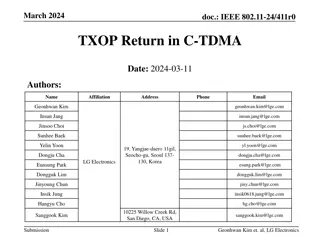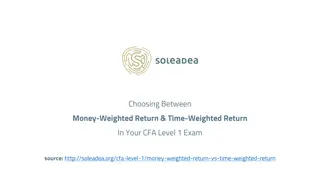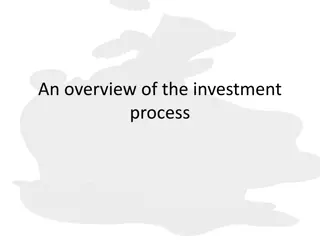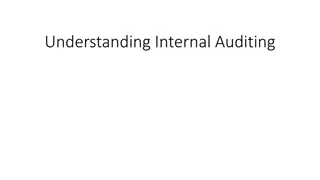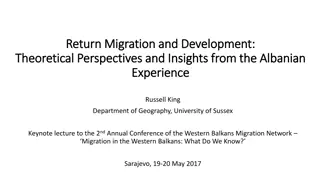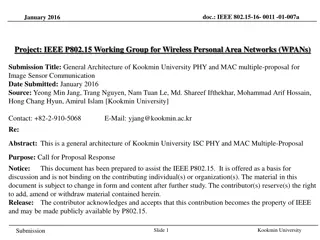Exploring Hybrid Auditing Methods in Corporate Governance
Project led by Gunilla Eklöv Alander delves into assessing security in corporate governance without an internal audit function. The study examines various professions contributing to digitalized internal control environments and analyzes the traditional division of responsibilities between internal
2 views • 8 slides
Managing Interest Rate and Currency Risks: Strategies and Considerations
Interest rate and currency swaps are powerful tools for managing interest rate and foreign exchange risks. Firms face interest rate risk due to debt service obligations and holding interest-sensitive securities. Treasury management is key in balancing risk and return, with strategies based on expect
3 views • 21 slides
Improving Heat Rate Efficiency at Illinois Coal-Fired Power Plants
Heat rate improvements at coal-fired power plants in Illinois are crucial for enhancing energy conversion efficiency, reducing carbon intensity, and minimizing pollution. By increasing the heat rate/efficiency by 6%, these plants can generate more electricity while burning the same amount of coal. T
2 views • 11 slides
Wage Remuneration Methods Overview
Dr. B. N. Shinde, Assistant Professor at Deogiri College, Aurangabad, presents an insightful overview of methods of wage remuneration including Time Rate System, Piece Rate System, and Combination of Time and Piece Rate System. Time Rate System is the oldest method where workers are paid based on ti
0 views • 16 slides
Audit Sampling Guidelines and Reference Materials for Internal Auditors
Review authoritative guidance for audit sampling and the potential for external auditor reliance on internal auditors. Understand and apply concepts related to audit sampling to project results with certainty. Available reference materials include AICPA Codification of Statements, AICPA Audit Guide,
6 views • 114 slides
Understanding Sale or Return (or Sale on Approval) in Financial Accounting
In financial accounting, the concept of Sale or Return (or Sale on Approval) involves sending goods to parties with the option to approve, accept, purchase, or return them within a specified time. This system is commonly used for introducing new products, where ownership transfer occurs only upon ac
0 views • 5 slides
Understanding Risk and Return in Corporate Finance
Exploring risk and return in market history is crucial for determining appropriate returns on assets. By analyzing dollar returns, percentage returns, holding period returns, and capital market returns, investors can grasp the risk-return tradeoff. Lessons from capital market return history emphasiz
4 views • 18 slides
Understanding Cardiac Output and Venous Return in Cardiovascular Physiology
Cardiac output, stroke volume, end-diastolic and end-systolic volumes play vital roles in cardiovascular function. Factors affecting cardiac output include physiological conditions and pathological states like hyperthyroidism and myocardial infarction. Venous return, controlled by mechanisms like Fr
0 views • 27 slides
Understanding Homeostasis: Maintaining Internal Balance in the Body
The concept of homeostasis is crucial for understanding how the body maintains a stable internal environment despite external fluctuations. This presentation covers the definitions of positive and negative feedback mechanisms, components of feedback loops, and the role of homeostatic mechanisms in p
0 views • 33 slides
Transmission Rate Change Overview for June 1, 2020
Presentation on the Rate Change effective June 1, 2020, detailing RNS Rate adjustments, Annual Transmission Revenue Requirements, and Regional Forecasts. The RNS Rate increased to $129.26/kW-year reflecting transmission project impacts, while ATRR analysis showed changes in revenue requirements for
0 views • 25 slides
Internal Medicine Stage 1 Curriculum Teaching Toolkit: Capabilities in Practice
Capabilities in Practice (CiPs) describe the professional tasks within the scope of internal medicine, utilizing expert assessors for assessment validity. There are 14 CiPs as learning outcomes for internal medicine Stage 1, with descriptors, performance levels, and evidence for entrustment decision
0 views • 11 slides
Internal Audit Process & Audit Committees Overview
Explore the functions and responsibilities of internal audit processes and audit committees in the context of school boards in Ontario. Covering topics such as governance, risk management, compliance, and internal controls, the content delves into the structure, mandate, and activities of internal a
2 views • 34 slides
Understanding Foreign Exchange Rates and Market Forces
Foreign exchange rate is the rate at which one country's currency is converted into another's, reflecting purchasing power. The rate is determined by demand and supply in the foreign exchange market, influenced by factors like imports, exports, investments, and speculation. Equilibrium rate is reach
0 views • 42 slides
Understanding Data Rate Limits in Data Communications
Data rate limits in data communications are crucial for determining how fast data can be transmitted over a channel. Factors such as available bandwidth, signal levels, and channel quality influence data rate. Nyquist and Shannon's theoretical formulas help calculate data rate for noiseless and nois
0 views • 4 slides
Lateral Ankle Sprains Return to Basketball Presentation
This presentation focuses on the return-to-sport guidelines for basketball players after a lateral ankle sprain. It covers the prevalence of ankle sprains in basketball, the PAASS framework for assessment, specific tests for return-to-sport decisions, common impairments, athlete perception, sensorim
6 views • 16 slides
Impact of Data Analytics and Consulting Activities on Internal Audit Quality
This research examines how the use of data analytics and consulting activities affect perceived internal audit quality. The study investigates the relationship between these factors and top management's perception of internal audit quality. Through online scenario-based experiments with middle and t
2 views • 11 slides
Understanding Heart Rate Variations During Rest and Exercise
This experiment focuses on measuring heart rate at rest and after physical exercise, exploring the factors that influence heart rate changes. Through hands-on activities and theoretical lessons, students learn about the cardiac cycle, the circulatory system, and the impact of physical exertion on he
1 views • 22 slides
Estimation of Drying Time in Spray Drying Process: Diffusion and Falling Rate Periods
The estimation of drying time in a spray drying process involves understanding diffusion-controlled falling rate periods, constant rate periods, and the mechanisms by which moisture moves within the solid. The drying rate curves depend on factors like momentum, heat and mass transfer, physical prope
0 views • 8 slides
Understanding the Capital Asset Pricing Model (CAPM) for Required Return Calculation
Learn about the Capital Asset Pricing Model (CAPM) and how to calculate the required return on an investment using this model. Explore key concepts such as stock return, market return, beta calculation, and more with a practical example involving Riyad Bank and Tadawul All Shares Index. Utilize dail
1 views • 35 slides
Republic of South Africa (RSA): COSO Components 2 & 3 with 3 Lines of Defence Approach
The presentation delves into RSA's approach to the COSO components, focusing on Risk Assessment and Internal Controls. It discusses the legislative mandate, Treasury regulations, and the COSO Internal Control Integrated Framework. The Risk Assessment section covers levels, matrices, and key instrume
0 views • 13 slides
Empirical Analysis of Kuwaiti Dinar Exchange Rate Behavior and Misalignment
This research focuses on studying the behavior of the real equilibrium exchange rate (REER) of Kuwaiti Dinars, estimating the equilibrium exchange rate using the BEER model, and calculating real exchange misalignments (RERM). It delves into the impact of exchange rate fluctuations on macroeconomic v
0 views • 15 slides
Understanding Internal Controls and the COSO Framework
Internal controls play a vital role in organizations, providing reasonable assurance on achieving objectives. The COSO framework outlines the five integrated components of internal control, emphasizing the importance of control environment, risk assessment, control activities, information, and monit
1 views • 18 slides
Understanding Internal Audit and Controls Process
This content provides an overview of the pre-audit presentation, objectives of the presentation, the definition of internal audit, the role of internal audit in examining university departments, the university audit process, internal audit reporting lines, and insights on internal controls in an org
3 views • 30 slides
Overview of Internal Combustion Engines and Their Components
Internal combustion engines are devices that convert fuel's chemical energy into thermal energy, which is then used to produce mechanical work. The engines can be classified into two types - External Combustion Engines and Internal Combustion Engines. Internal combustion engines include components l
2 views • 53 slides
Internal Audit Department Overview
The Internal Audit Department at the University of North Carolina Charlotte is led by Chief Audit Officer Jennifer Walker and Internal Audit Manager Kevin Vehar. The team provides risk-based assurance, advisory services, and investigations to enhance organizational value. Their mission is to offer o
1 views • 17 slides
District Campus Return Plan Overview
The District Campus Return Plan, led by Bret Watson, VP of Finance & Administrative Services, outlines a phased approach for the safe return of students and staff to campus following state and county guidelines. The plan includes pre-planning, preparing buildings and classrooms, acquiring PPE, imple
0 views • 9 slides
Understanding the Impact of Internal Environment Components on Business Decisions
The internal environment of a business is influenced by factors like value systems, vision, management structure, internal power relationships, and human resources. These components have a direct impact on decision-making processes and organizational performance. By analyzing and understanding these
1 views • 32 slides
Addressing Sewer Rate Changes and Structural Remedies
City's sewer rate changes history and underfunding issues due to lack of cost centering, overburdening the general fund, and inadequate capital project funding. The methodology for rate review highlights the need for reflective rates to cover service costs. The current rate structure shows deficienc
0 views • 19 slides
Understanding E-Rate Program: Education Discounts & Benefits
The E-Rate Program, also known as Education Rate, offers discounts to schools and libraries for affordable telecommunications and Internet access. Administered by USAC, this program aims to provide crucial funding and support to educational institutions. With an annual budget of $3.9 billion and dis
0 views • 35 slides
Understanding Internal Rate of Return (IRR) in Investments
Internal Rate of Return (IRR) is a method used to assess the profitability of potential investments by calculating the discount rate that makes the net present value of an investment zero. It considers the time value of money and helps in comparing projects based on their returns relative to costs.
0 views • 5 slides
IEEE 802.11-24/411r0 TXOP Return in C-TDMA
This document discusses the TXOP return mechanism in C-TDMA operation for IEEE 802.11 networks. It explores the importance of timely TXOP return for efficient utilization of medium and proposes considerations for implementing TXOP return in C-TDMA. Various TXOP return scenarios and frame types are a
0 views • 11 slides
Choosing Between Money-Weighted Return & Time-Weighted Return in CFA Level 1 Exam
Learn the differences and implications of Money-Weighted Return (MWRR) and Time-Weighted Return (TWRR) for your CFA Level 1 exam. Understand how to calculate these returns, their characteristics, and when each method is appropriate. Clear your calculator before computations, and remember the key tip
0 views • 12 slides
Understanding the Investment Process and Rate of Return
Investors choose to invest by saving instead of spending to trade off present consumption for larger future consumption. The rate of return on an investment is measured by factors such as the pure rate of interest, time value of money, inflation impact, and risk premium. Investments involve committi
0 views • 41 slides
Understanding Markowitz Risk-Return Optimization
Modern portfolio theory, introduced by Harry Markowitz, aims to maximize expected return while managing risk. Efficient portfolios are represented by points on the efficient frontier, diversifying investments for optimal risk-return trade-offs. The risk-expected return relationship is depicted graph
0 views • 16 slides
Understanding Internal Auditing: Role and Importance
Internal Audit Department exists to provide independent assurance, consulting services, and improve operations by evaluating risk management, internal controls, and governance processes. It reports to the campus president and the Director of System-wide Internal Audit at TBR while serving the colleg
0 views • 7 slides
Understanding Rate Expressions in Heterogeneous Systems
In heterogeneous systems, the rate expression involves mass transfer terms alongside chemical kinetics terms due to the presence of multiple phases. Different types of heterogeneous systems have varying mass transfer complexities, making a general rate expression challenging to define. Examples such
0 views • 29 slides
Return Migration and Development: Theoretical Perspectives and Insights from the Albanian Experience
Keynote lecture by Russell King at the 2nd Annual Conference of the Western Balkans Migration Network discussing the relationship between return migration and development. Topics include definitions and measures of migration and development, unpacking the migration-development nexus, theorizing retu
1 views • 20 slides
SMMPA Annual Meeting Transmission Rate Update 2018
SMMPA, a not-for-profit political subdivision in Minnesota, updated its transmission rate formula in August 2018. The Attachment O timeline outlines crucial dates for stakeholders, including the annual meeting on formula rate updates. SMMPA, as a Transmission Owner in MISO, follows FERC-approved tem
0 views • 8 slides
Understanding Heart Rate and Pulse: Key Differences and Measurement
Heart rate, also known as pulse, is the number of times your heart beats per minute. It varies based on factors like age, fitness level, and emotions. Pulse is a direct measure of heart rate. Learn about the differences between heart rate and blood pressure, how to measure heart rate, and what const
0 views • 8 slides
General Architecture of Kookmin University's Image Sensor Communication Proposal
Kookmin University submitted a proposal to the IEEE P802.15 Working Group for Wireless Personal Area Networks, focusing on the PHY and MAC layers for image sensor communication. The document outlines design principles, specifications, frame formats, and considerations for both layers. Definitions re
0 views • 41 slides



